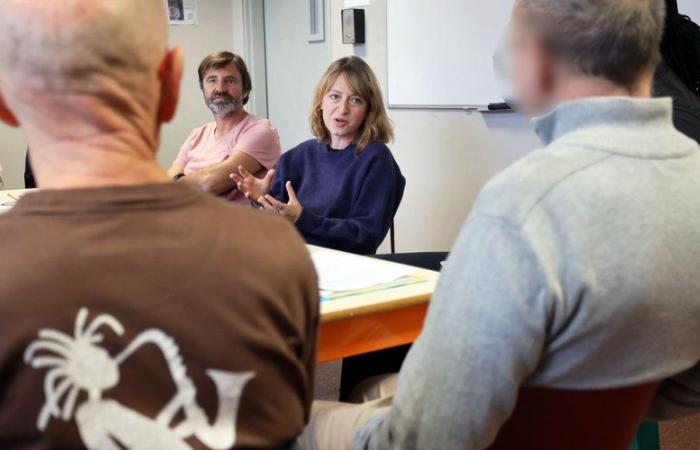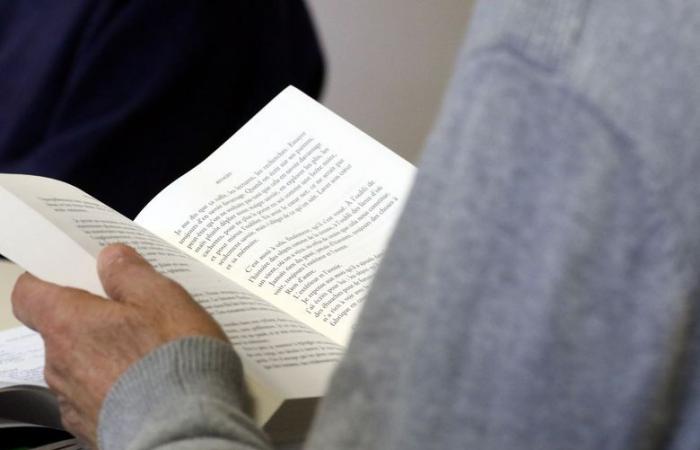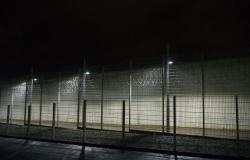the essential
The Montauban remand center (Tarn-et-Garonne) is participating for the first time in the Goncourt for prisoners which will be awarded on December 17. This Friday, November 8, the meeting between the writer Hélène Gaudy, a Goncourt finalist for her book “Archipels”, and seven detained readers offered a very beautiful moment, full of spontaneity and sharp critical thinking.
It’s not every day that a leading novelist passes through the walls of a prison to come and discuss literature, writing and the meaning of life with inmates. This rare moment, Hélène Gaudy experienced it, this Friday, November 8, at the Montauban remand center (Tarn-et-Garonne), one of the 45 penitentiary establishments in France which are participating this year in the Goncourt for prisoners.
The author of the magnificent “Archipels” (editions de l’Olivier), one of the four finalist books for the prestigious Goncourt prize won Monday, November 4 by Kamel Daoud for “Houris”, spoke for more than two hours with seven inmates who read and deciphered his work with Laurent Aragones, the local head of education at the remand center.
“I am very happy to meet you, to come and discuss the texts. Feel free to ask all the questions you want about the book, the writing activity, what you like to read,” says Hélène Gaudy, who will be the guest of the next Letters of Autumn festival in Montauban (meeting from November 18 to December 1).
A message received five out of five by Marc, the first to get started. “I read the 16 books selected by the Académie Goncourt. At first, I wasn’t very keen. I started with that of Olivier Morek (Editor’s note: “The Winter Warriors”) and I couldn’t put it down. It was something of an experience, I had lost the habit of reading.” Marc addresses the writer: “What were the reactions of those close to you when you wrote this book?
– I told my father quite early on that I was going to write this book. My father is old, I felt that it was the time to meet him through this book.”
DDM – DDM MANUEL MASSIP
When we are deprived of freedom, we have the impression of being able to escape through islands, books, it feels good.
On the other side of the table, a young inmate doesn’t miss a bit of the exchange. “Before coming here, the only books I had read were Harry Potter. I really enjoyed all the stories. When you are deprived of freedom, you have the impression of being able to escape through islands , books, it feels good. What I appreciated about yours is the fact of discovering someone after you have known them all your life. I found this book very intimate. . It felt weird, I Hesitated at first. I wanted to know, what is your relationship with the islands? Have you traveled or is the island a kind of shell for you that allows you to go and meet people?
Hélène Gaudy is moved: “This idea of the shell is beautiful. My desire, while writing Archipelagosit was really not about telling our lives, but about thinking about how memories are formed and passed on to children. I bring up everything my father taught me to explore.”
DDM – DDM MANUEL MASSIP
Another inmate further enriches the debate, without filter. “It’s not my cup of tea but it’s nicely written, so let’s go a little further. I admit, I stopped at the 100th page. There are two or three books in this selection for which we can say that we are in the ideal place to read them, it works a lot on the imagination. There are a lot of things on tickets, tickets of everything in fact.
“Even parking meter tickets even though my father doesn’t have a driving license!”, the novelist confides to him. Grateful, the inmate adds: “It’s natural, it’s clean, it’s beautifully written, I’ll tell you again, so I’ll finish your book eventually. But I’d like to read it in peace. Two or three people in cell, it’s difficult to tell your neighbor to turn down the sound on the TV.”
The most timid of the seven ends up breaking through the armor: “Me, I wasn’t at ease like Marc. I’m normally into science fiction. I found your book very beautiful. It’s a beautiful tribute to your father and grandfather.”







